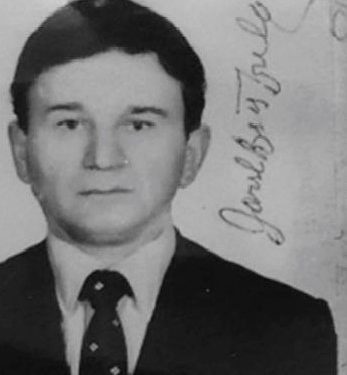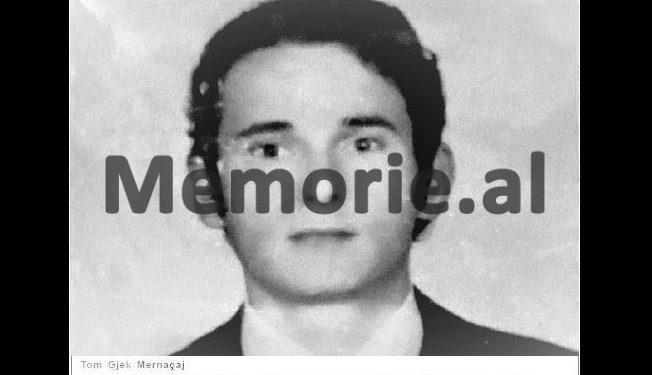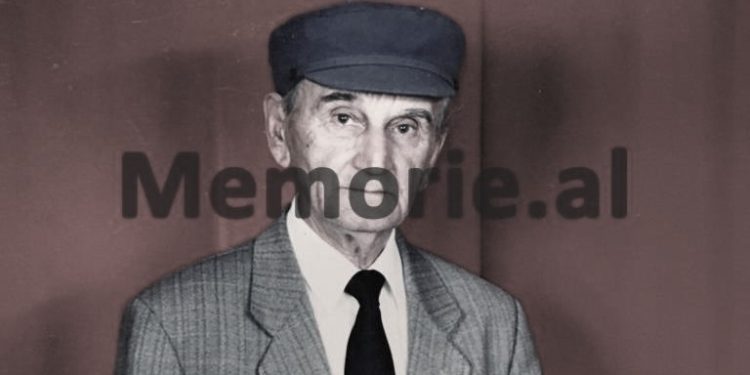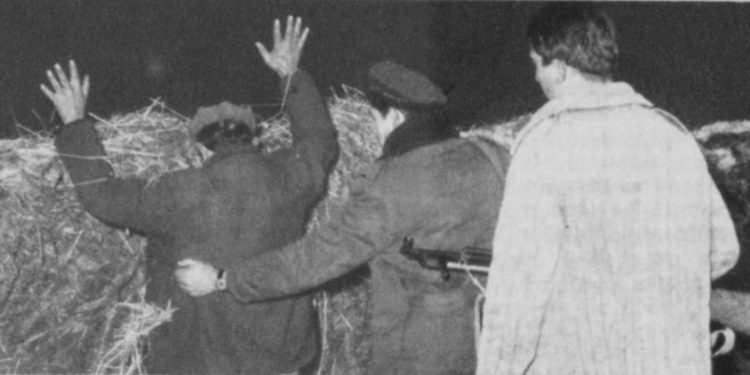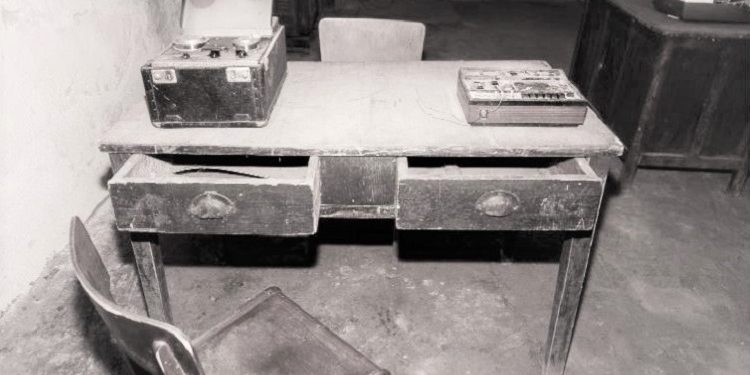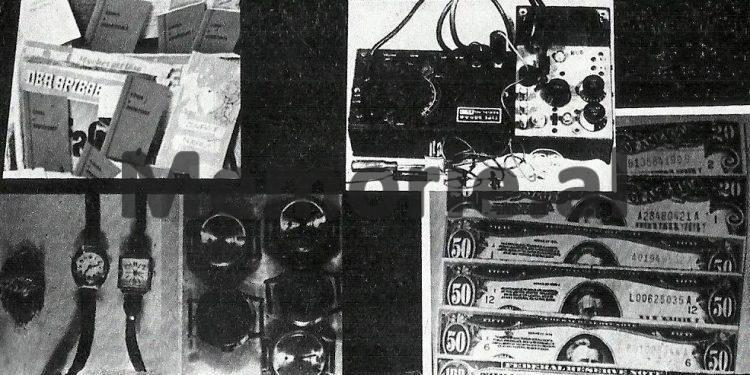Memorie.al / “Antoni told us that if we wanted, he could introduce us to an Albanian boy, who escaped from Albania a few months ago and was called Qemal Nelku. Qemali was from Tirana and had escaped, as he told us, to have fun in the ‘free world’. Abdyli agreed with Antoni’s proposal and after that, he brought us Qemali himself. Abdyyl told Qemali, that we were escaped Albanians coming from New York, to enter Albania illegally, in order to carry out a mission assigned by the organization ‘Albanian Anti-Stalinist Resistance Front’ and proposed to him too came with us. Qemali expressed disbelief and doubted, telling us that; you may be Security people, but Abdyli took out our American passports and other documents.”
This is what is said, among other things, in the archival document with the minutes of the investigation of the Albanian-American, Tom Mërnaçaj, the man of the State Security, who in 1975, was infiltrated by the Albanian Political Intelligence who was acting in camouflage near the Albanian Mission in the Organization of the United Nations in New York, to make it possible for him to come to Albania with Abdyl Hakan Banushi, (originating from Golem of Gjirokastra, former member of the “National Front” forces, during the years 1943-’44, escaped from Albania in the 50s and resident in the USA), where he was engaged in the Albanian political exile and the “Free Albania” Committee.
Tom Mernaçaj recounts his adventure, following the number 1 wanted man of the communist regime of Tirana, Abdyl Banushi
The document, the content of which is revealed below, narrates the version of the State Security infiltrator, Tom Mernaçaj, about the arrest in April 1975 of Abdyl Banushi, the man who tried to kill Enver Hoxha with a firearm. According to this version, after several attempts to enter Albania, in order to blow up the statue of Stalin in the center of Tirana, as well as the Chinese embassy, Abdyl Banushi, the secretary of the “Albanian Anti-Stalinist Resistance Front”, based in New York of the USA, as well as Tom Mërnacaj, try to enter from the Yugoslav territory, exactly in the area of Hani i Hoti.
In this attempt, the two have as their last base the house of Tomá’s father, which was located in the Yugoslav territory. Both Tom Mernaçaj, in his testimony before the investigation, and Abdyli in his memoirs, written after his release from prison in 1991, give their versions of this event. Versions that the reader is given in full below.
D o c u m e n t i
Verbal process
(On the question of the witness Tom Gjek Mrnacaj)
In Tirana, on 10.IV.1976
I, Dhimitër Beshiri, the investigator of the Ministry of Internal Affairs, keep this record of the questioning of the witness Tom Mernaçaj, son of Gjeka and Mara, born in 1953, born in the village of Mali i Jushit, Shkodër, and resident in Tirana , with secondary education, Albanian nationality and Yugoslavian citizenship, no party, no convictions.
I received a notification about the criminal responsibility I have according to articles 220 and 226 of the Criminal Code of the People’s Republic of Albania, in case I give false testimony or refuse to show what I know about the case.
The witness
TOM GEKEK MERNAÇAJ
In August 1974, when I was working as a waiter in a New York restaurant, I met Abdyl Hakan Banushi by chance. I happened to serve him at table. He asked me where I was from and I answered that I was Albanian. In the continuation of the conversation, he told me that he was also Albanian and that he had come to New York with service, because he was an officer of the State Security bodies.
For this, he took out a document with a photograph of himself, in which he had appeared in the uniform of an Albanian officer, with the rank of captain of the Albanian State Security. He told me that if I wanted, he could take me back to Albania. Later, I met Abdyl a few more times, in the restaurant and in other places. After getting to know me well, where I was from and why I had gone to the USA, he told me the truth, telling me that he had escaped from Albania, as a political opponent of the people’s power, nearly 10 years ago.
He told me that the Albanian refugees there had created an organization with the name; “Albanian Anti-Stalinist Resistance Front” and started giving me various propaganda materials of this organization. At his request, I visited him several times in the house where he lived, in the Brooklyn neighborhood of New York, in a good apartment, near the beach. Because he was not married, he lived alone. At home, Abdyli kept various propaganda materials of the “Albanian Anti-Stalist Resistance Front” organization.
In these materials, which I have read, there was a call for the organization of an armed uprising of the Albanian people against the popular government. In the conversations with him, Abdyli proposed me to become a member of that organization, because that’s how I would fight for the homeland, for Albania. I asked him how this organization was organized and he explained that it was organized in such a way that each member knew only two other members of the organization, so a big conspiracy was maintained.
Each member of the organization performed various tasks assigned to them by its leaders, which, as he told me, I would get to know later. I agreed to become a member of the aforementioned organization, in order to learn as much as possible about its composition and concrete activity against Albania. I told Abdyl that I agreed with his proposal and since then, he has always kept me close to him.
In September-October 1974, together with Abdyl, I went to the offices of the “Free Albania” Committee in New York, where I met and held various conversations with the leaders of this committee, Rexhep Krasniqi, Vasil Gërmenji, Mejit Dibra and Hamdi Uruçi, who often came to this Committee, about whom I later learned both from Abdyli and from themselves, that they were the leaders of the “Albanian Anti-Stalinist Resistance Front” organization. I also learned that Abdyl Banushi, together with Idriz Lamajn, were at the head of the aforementioned organization.
During the conversations I had in the “Free Albania” Committee with Abdyl, Rexhepi, Vasil, Hamdi, Mexhit, etc., I learned that this organization is an organization of concrete actions against popular power in Albania. They told me that its members have carried out several actions against the people’s power and specifically, they have thrown explosives at the RPSH Embassies in Rome and Paris, they have sent groups of saboteurs to Albania to carry out actions, which are also talked about in the organization’s propaganda materials, some of which we took with us and which were seized at the border, at the time of the arrest.
I was interested in learning who the specific people were who had requested these shares and I was able to learn this only when Abdyl Banushi proposed to me that together we come illegally to Albania, to perform some tasks on the occasion of November 29, 1974, the 30th anniversary of the liberation of Albania, for which, as he told me, the leadership of the organization had decided, a task that, as I will explain in detail, I accepted in order to deliver him, Abdyl, to the authorities competent Albanian…!
…On March 26, 1975, we left New York by plane for Montreal, Canada, arriving at about 2:50 p.m. On the same date, at 22:30, with the “Air Canada” plane, we left for Athens, where we arrived around 14:30, on 27.03.1975. After we checked into the Aspasia Hotel, I sent a letter to my wife, Paulina, in New York, telling her that I was in good health and that I was in Athens. The next day, Abdyli told me to go to Llavria, to meet his friend, Anton Gjelajn, who has escaped from Albania for the last 4-5 years.
After we arrived in Llavrio, Abdyli told me to go to Antoni’s house to meet him, since he himself did not have to meet Antoni’s father-in-law, with whom he shares a house, and I took him with me to meet him. Abdylin, who was waiting for us in a nearby buffet. Abdyli told Antoni the reason for our coming from New York and asked him, according to the agreement they had made, to come with us, to carry out the assigned mission to Albania. Antoni said that he would agree to come, but in those days, he would leave for Canada, together with his family, because his immigration documents had been approved.
He told us that if we wanted, he could introduce us to an Albanian boy, who escaped from Albania a few months ago and was called Qemal Nelku. Qemali was from Tirana and had escaped, as he told us, to have fun in the “free world”. Abdyli agreed with Antoni’s proposal and after that he brought us Qemali himself. Abdyyl told Qemal that we were Albanian fugitives coming from New York to enter Albania illegally, in order to carry out a mission assigned by the “Albanian Anti-Stalinist Resistance Front” organization and proposed to him to come with awe.
Qemali expressed disbelief and doubted, telling us that you might be Security people, but Abdyli took out our American passports and other documents. Qemali said that; I believe you, but I can’t come with you, because I’m afraid they’ll catch me and punish me severely. In the evening, I, Antoni, Abdyli and Qemali went to Athens, to the hotel room where we had taken a seat and talked with Qemali again. Abdyli asked him about the situation in Albania. Qemali told him about the punishment of Teme Sejko’s son, for a noise of some prisoners, etc.
Abdyli again proposed to Qemal to come with us to Albania, but the latter did not accept. He told us that in Tirana, he had his brother, Hamit Nelku, who lives in the neighborhood “Ali Demi” and that he wanted to escape from Albania, so if you want, I will give you a letter so that when you meet him you can give it to him and if you can, help him escape abroad. Abdyli received the letter…! Abdyli asked Qemali if he knew Osman Kazazi, who lived in Tirana, and he answered that he knew him and that he lived near his house, in the “Ali Demi” neighborhood, for which he also gave him his address written in a letter, which was also seized at the time of the arrest…!
On March 29, 1975, we left Athens for Ioannina, where we spent two days at the “Olympic” hotel. In the evening, Abdyli called Nikolla Plasoti (the organization’s liaison, the man who provided the explosives and weapons, our note) and Lefter Guvelin. Lefteri was not at his house, as he had gone to Athens, while Nikola called us on the phone himself and told us that the next day at lunch; he would come to pick us up in his car, to Igoumenica. Nikola worked as a taxi driver in Igoumenica. The next day, Nikola came and took us to Ioannina.
On the way, Abdyli stayed at Lefter Guveli’s house, while Nikolla and I went to his house. In the evening, Nikolla showed me a letter that Abdyl Banushi had sent him from New York, in which he accused Nikolla of working for dollars and not for patriotism, for the liberation of Albania from the communists, and told me that he was unhappy, this letter from Abdyl…!
…On April 2, Abdyli came again, who asked Nikolla, where was the best place to cross the border illegally, to Albania. Nikola told him that; about that, ask Lefter. The next day Nikolla and I went to Lefter’s house, where Abdyli was also. According to Nikola’s announcement, another person also came there; whose name was Gaqo Gaqi. The conversation between them took place in Greek, since Gaqo did not know Albanian and I did not understand anything from their conversation. In the end, Abdyli told me that they would cross the border near Ioannina. I told him I agreed that they knew the place.
Lefter made a letter to send to a villager who lived near the border, who, as far as I remember, is called Vasil. He took this letter to send to him, along with 50 dollars, Gaqo Gaqi. In the evening, Nikolla and I returned to the latter’s house, while Abdyli stayed at Lefter’s house. On April 4, 1975, Nikolla, on Abdyl’s order, went to Gaqi’s house, where he took a machine gun, two pistols, a compass, etc., which we had left there in November 1974. In the afternoon I and Nikolla, we went back to Lefter’s house, where Abdyli and Gaqo came a little later.
Nikola told Abdyl about the letter he had sent him from New York, in which he accused him of working only for dollars and not for patriotism and asked Abdyl to pay the expenses he had incurred, for using the taxi those days. Abdyli was angry about this matter and insisted that he had not written that letter, which Nikola presented to him. In our presence, the letter was read, which was typewritten and bore the name of Abdyl Banushi. During the argument, Nikola got angry and left.
Lefteri said that; when a bad job starts, it will end like this. Nicholas’ anger took away the possibility of the help that he and his friends would give us, to enter Albania illegally, from the Greek territory, through Konispoli. I begged Lefter to give us weapons and explosives, because we would try to enter Albania illegally, through Yugoslavia. He agreed and after we took the weapons from him, we left by bus from Ioannina to Athens. Before we parted with him, Gaqi told us that he was ready to help us, if we went to him, even with 20 people.
We arrived in Athens on April 5, 1975 and from there by train, we left for Skopje. After the fight with Nikollë Plasoti, in a conversation with Abdyl, in order not to fail the plan I had, handing it over to the competent Albanian bodies, I told him that we could enter Albania illegally through the border area of Hoti, near Shkodra , where I have my people. Abdyli accepted this idea and therefore, we left for Yugoslavia, by train. After arriving in Skopje, we left the next day for Titograd, where we arrived on April 7, 1975, and from there, they went to my house in Titograd.
In conversations with my father, Abdyli told him that we had come to illegally enter Albania and would carry out tasks against the popular government. Since the father said that he did not enjoy this job, I signaled to Abdyl to go to sleep, since I would talk to the father myself. When we were alone, I told my father the true purpose of my coming to Albania, to deliver Abdyl, as a dangerous man for the popular power. He was very afraid that something might happen at the border, but I reassured him, telling him that I would be careful and that what I was doing was for the benefit of the homeland.
The next day, throughout the day, we stayed at home and in the evening, I, Abdyli and my father, left for the border. From Titograd, to the village of Drume, we went by taxi, while from there, to the border, we traveled on foot, guided by my father, who knows the border area well. When we approached about a km. border line, father, after instructing us on the path we should follow further, parted with us. Heading home as we continued down the road to the border. On the way, I lost my pistol, after I fell from a small rock, about which I did not tell Abdyl.
During the journey, I held the machine gun in my hand, while Abdyli held the pistol. We crossed the border at the place called Fjerkuqe, under the high voltage Albania-Yugoslavia line. This was on the night of April 7, 1975, at dawn. As we walked for a while, we reached the clone (wire fence) of the border, which I knew was there. Abdyli just saw the clone; he told me that; you betrayed me, after I had assured him that in that area, there were no clones. I told him that; I don’t understand, as me and father, we didn’t know about this. He told me to go back, to find some place without clones, because by crossing the clone, we would be dictated to and caught by the border guards.
We, continued Abdyli, made the mistake of leaving the ladder to Lefter Guveli in Greece. These stairs, before we left New York, (Abdyl showed me a pair of stairs prepared by him and said that with these, it is easy to cross the clone. These stairs were removable and very light). After Abdyli told I to go back, I told him that I agreed and he started walking, in the direction of Yugoslav land.
At this moment, I hit him on the head with the barrel of the machine gun, knocking him to the ground, unconscious. After the blow he fell to the ground and I jumped on top of him to remove the pistol, which he had in his belt. I took it and shot it several times, more than I can remember, so that the border guards would come to pick us up and take us to the border post. I shot the pistol in the air. After a while, the guards came, who took us and took us to the post office.”
Tom Mernacaj, the man who handed over Banushi, was accused of agitation and propaganda and was allowed to return to the USA!
Tom Gjek Mernaçaj, the man who took the risk by forcibly neutralizing and handing over to the Albanian authorities Abdyl Banushi, one of the leaders of the “Albanian Anti-Stalinist Resistance Front”, based in New York, USA and the author of placing explosives in the Albanian Embassies in Rome and Paris, he was released in April 1976, after a year in prison.
A year ago, after they had crossed into Albanian land in Han t Hoti, he had shot his friend with the barrel of his machine gun, knocking him to the ground and finally sent him to the inevitable prison. In the document, the content of which will be below, it is said that initially Tom Mernaçaj was kept in prison because he had agreed to become a member of the “Albanian Anti-Stalinist Resistance Front” organization and that he was released after performing a patriotic act, delivering Banushi to Albanian justice.
D o c u m e n t i
DECISION
(On dismissal of the case)
In Tirana, on 10.IV.1976
I, Dhimitër Beshiri, the investigator of the Ministry of Internal Affairs, after studying the materials in charge of the defendant Tom Gjek Mernaçaj.
I realized
On 8.IV.1975, the criminal case was initiated and Tom Gjek Mernaçaj was brought under criminal responsibility, under arrest, for the reason that at 01:30, on the above date, he was caught red-handed by the border guards of Hoti post office, Shkodër, illegally entering the territory of RPSH through Yugoslavia, this crime provided by article 255/1 of the Criminal Code of RPSH.
From the subsequent investigations, in the months of August-September 1974, Tom Gjek Mernaçaj, according to the proposal of the defendant Abdyl Banushi, agreed to become a member of the organization “Albanian Anti-Stalinist Resistance Front” and therefore, was charged with the crime provided by article 73/1, in relation to article 76, of the Criminal Code.
From the totality of materials collected in the investigation file, during the investigation it is proven that; the aforementioned, from the moment he learned that the “Albanian Anti-Stalinist Resistance Front” organization was carrying out terrorist activities against the People’s Republic of Albania and that the defendant Abdyl Banushi himself presented a significant danger to our country, decided to hand him over to our bodies.
A deed he did on April 8, 1975, when they just entered the Albanian territory, hit him on the head and handed him over to our border guards, thus performing a patriotic act in the service of the RPSH. From the above, it is concluded that the offense committed by the defendant Tom Gjek Mernaçaj, does not constitute the crime, for which the defendant was taken and for this reason, based on article 196/1, in relation to article 98, point 5 of the Criminal Procedure Code:
DECIDED
Dismiss the criminal case against Tom Gjek Mernacaj.
I will communicate this decision to the aforementioned, taking his signature. Memorie.al
THE INVESTIGATOR
Dhimiter Beshiri
The decision was announced to me today, on 10.4.’76.
Tom Gjek Mernacaj




